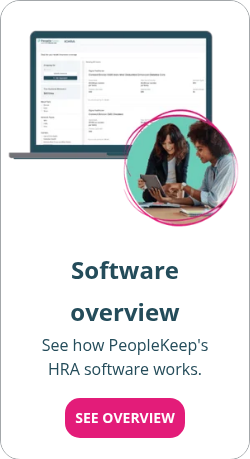Is the ICHRA good for employees?
By Holly Bengfort on November 27, 2024 at 10:45 AM
As healthcare costs rise, it's important to find a health coverage solution that benefits both employers and employees. Many organizations turn to the individual coverage health reimbursement arrangement (ICHRA) for its affordability. A report from the HRA Council1 found that the number of employers who adopted ICHRAs increased by 29% between 2023 and 2024.
But does this cost-effective health benefit end up providing your employees with less value when it comes to their healthcare? Far from it.
In this article, we'll explain how the ICHRA positively impacts employee satisfaction, financial security, and overall well-being.
In this blog post, you'll learn the following:
- How the ICHRA compares to a traditional group health plan.
- How the ICHRA saves money for you and your employees.
- How the ICHRA gives employees greater control over their healthcare.
What is the ICHRA?
The ICHRA is an alternative health benefit to group health insurance. It provides cost control and flexibility for employers. It allows you to reimburse employees for individual health insurance premiums and other medical care expenses. This way, you can help your employees pay for their own individual health plan coverage instead of buying a one-size-fits-all group health plan for them.
Keep in mind that the ICHRA only covers W-2 workers who have qualifying forms of individual health insurance coverage. Uninsured employees and those on traditional group plans, like a spouse’s or parent’s, can't use an ICHRA.
Here's how the ICHRA works:
- You set a monthly allowance amount for your eligible employees.
- Employees buy their own individual health insurance policies and opt into the benefit.
- Employees pay their premiums and cover other healthcare needs with personal funds.
- They submit their proof of their healthcare costs to you or your HRA administrator for reimbursement.
- Once you approve the eligible healthcare expense, your employees receive tax-free reimbursements up to their allowance amount.
Unlike traditional group plans, an ICHRA offers employers flexibility to design benefits based on workforce needs. You can vary contribution amounts and benefit eligibility for up to 11 employee classes. For example, you can offer different allowances to your part-time employees, seasonal employees, or temporary employees that you would your full-time staff.
Myths surrounding ICHRA
As the ICHRA becomes more popular, so do the misconceptions around the benefit. Some advocacy groups believe that the ICHRA invites discrimination, thanks to employee classes. Others say that the quality of individual health plans is worse than group plans. However, the ICHRA actually promotes flexibility and greater employee choice.
In the next section, we’ll cover the benefits of an ICHRA for employees.
See our article on myths about HRAs.
What are the benefits of ICHRA for employees?
While the ICRHA presents several advantages to business owners, it's also beneficial for employees.
Here are five ways the ICHRA benefits your employees:
1. Empowerment in healthcare choices
ICHRAs give employees freedom of choice. Rather than limiting them to a single group plan their employer offers, employees can shop for individual plans that align with their unique needs and financial situations. This could lead to better health outcomes.
Employees can choose plans from public or private exchanges and various metal levels. For example, younger employees who are generally healthy can buy plans with higher deductibles and lower premiums. Older employees or employees with families can get the comprehensive coverage they need.
The ICHRA also creates portability. While employees can’t take their ICHRA allowances with them when they leave a company, they can keep their individual health insurance plans.
2. Access to comprehensive coverage
With the ICHRA, employees can access plans that may offer broader coverage options or specialty services that might not be available in traditional employer-sponsored group health plans. This flexibility can lead to higher employee satisfaction with their healthcare options.
Plus, an ICHRA can reimburse employees for certain types of ancillary coverage, like dental or vision insurance.
3. Tax advantages
An ICHRA allowance won't count as part of an employee's taxable income. Employer contributions made to an ICHRA are tax-deductible for the employer. Reimbursements are tax-free for the employee, providing financial benefits to both parties.
4. Adaptability
Employees can use their ICHRA funds to pay for a wide range of medical expenses. Eligible expenses include monthly premiums, copayments, and other out-of-pocket costs. This adaptability can help them manage their healthcare costs more effectively. Your employees can also receive reimbursement for their spouses’ and dependents’ eligible expenses.
5. Encourages health awareness
Since employees are more involved in selecting their health coverage, they may become more health-conscious and engage more actively in their healthcare as they are responsible for choosing and using their individual plans.
What are the cons of an ICHRA?
While the ICHRA offers many advantages, you may wonder if this personalized health benefit has any downsides.
Consider these two factors:
- Eligibility requirements. Since the ICHRA only works with qualifying forms of individual health insurance coverage, some of your employees may miss out. So, if you have several employees covered by a spouse's or parent's plan, they won't be able to participate in this benefit.
- Premium tax credits. An ICHRA also impacts employees who receive premium tax credits (PTCs). ICHRAs come with restrictions on PTCs, which means employees enrolled in an ICHRA aren't eligible to receive these credits. Employees can opt out of the ICHRA, but they can only claim their tax credits if their allowance is unaffordable. For 2026, the affordability standard is 9.96%. So, for a plan to be considered “affordable,” employees can't be expected to pay more than 9.96% of their household income for their health coverage after factoring in their allowance. If their allowance is considered “unaffordable” and fails to meet the Affordable Care Act's minimum value (MV) requirements, they can opt out of the ICHRA and claim their tax credits.
Alternatives to the ICHRA
If you're not sold on the ICHRA, there are other types of HRAs to choose from. For example, the qualified small employer HRA (QSEHRA) may be a better fit for your team.
Here's how the QSERHA compares to the ICHRA:
- It’s for small employers. The QSEHRA is only for those with fewer than 50 full-time equivalent employees (FTEs), unlike the ICHRA, which works for employers of all sizes.
- Health plan coverage. With the QSEHRA, employees only need health plans that provide minimum essential coverage (MEC). So if you have several employees covered by a spouse's or parent's plan, they can still participate in the QSEHRA.
- Eligible expenses. Just like with the ICHRA, the QSEHRA allows you to provide tax-free reimbursements to your employees for their individual health insurance premiums as well as other eligible medical expenses.
- Annual contribution limits. Unlike the ICHRA, the IRS sets annual reimbursement limits on employer contributions for the QSEHRA. It doesn't offer customization by class of employees either. But you can still customize monthly allowances based on employee age and family status.
PeopleKeep makes personalized health coverage easier
If you're worried about the time and effort it takes to offer a QSEHRA or an ICHRA on your own, PeopleKeep can help relieve some of the administrative burden.
Our team of experts simplifies and streamlines the ICHRA process by:
- Helping with HRA plan design
- Generating HRA plan documents
- Reviewing employee reimbursement requests for their eligible health expenses
- Storing documents and substantiation for employee reimbursement requests
- Making it easy to invite and send notices to employees
- Reminding you when Form 720 PCORI fees are due
- Providing award-winning customer support
Plus, we make it easier for your employees to shop for an individual health insurance plan. That way, they don't have to navigate the individual market on their own. They won't have to searching for a qualified health plan directly from an insurance carrier either.
Through our platform, your employees can compare medical plans based on network type, metal tier, or carrier. They can see each plan’s deductible and maximum out-of-pocket expenses before deciding.
Conclusion
There are several reasons to choose an individual coverage HRA (ICHRA) over a traditional group health insurance plan. The ICHRA empowers employees in their healthcare choices, providing them with options that suit their individual needs. It's also a flexible and affordable coverage option for employers.
Check out more resources
See these related articles

What is an ICHRA?
What is an ICHRA, and how does it work? Find out everything you need to know about this innovative healthcare option: the individual coverage HRA.

Does ICHRA work with group health insurance?
Learn how ICHRA and group health insurance can work together. Understand coordination rules and when offering both options may be beneficial.

What to expect when your employer offers you an ICHRA
Curious about ICHRAs? Discover what to expect when your employer offers you an individual coverage health reimbursement arrangement with this guide.



